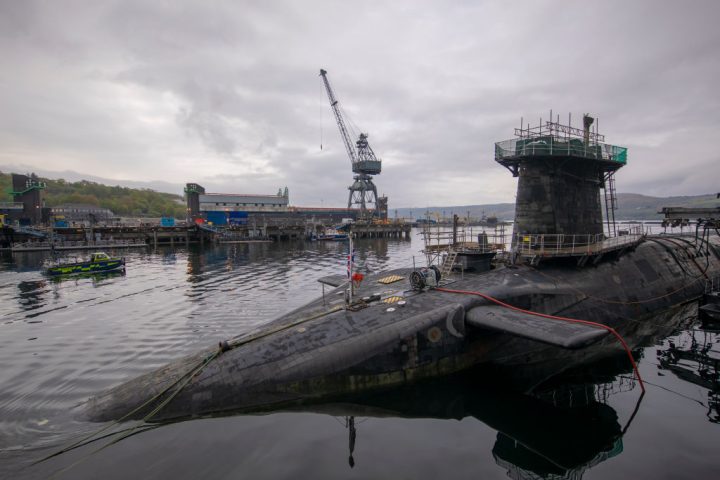Three weeks after the Prime Minister visited Barrow-in-Furness to pose with models of submarines, the Labour leader Sir Keir Starmer has made his way to BAE Systems in Cumbria to emphasise his support for the United Kingdom’s nuclear deterrent. He penned an accompanying manifesto for the Daily Mail, in which he said his party’s commitment to Trident was ‘total’ and ‘unshakeable’. He also expressed a ‘a cast-iron commitment’ to build the four new Dreadnought-class nuclear submarines which will carry Britain’s ballistic missiles from the early 2030s onwards.
This is politics. Starmer remembers that at the last election barely one in ten voters trusted the Labour party on defence and national security. He also knows that, with Russian forces occupying swathes of eastern Ukraine, Iran and Israel shadow-boxing in the Middle East and Houthi militants threatening maritime trade in the Red Sea, the world feels even less secure than it did five years ago. Moreover, he is stalked by the fear that Labour’s seemingly inevitable landslide election victory will somehow elude it, that some unforeseen circumstance will cheat the party even at this late stage.
When it comes to defence, scrutiny and security will always be in tension
Starmer has thrown everything at his declaration on Trident. He refers to his party’s policy as ‘a generational, multi-decade commitment’, and promises a ‘triple lock’ nuclear deterrent (actually just three separate pledges): all four Dreadnought-class submarines will be built in Barrow; the Labour Party will maintain continuous at-sea deterrence, the UK’s round-the-clock ability to launch nuclear weapons at any time; and the submarine fleet will receive any upgrades it needs so that it is always properly equipped.
Whatever you think of the nuclear deterrent, Starmer’s adamance comes at a price. Trident is vastly expensive: the design and manufacture of the submarines is estimated at £31 billion, with an additional contingency of £10 billion. As of May last year, a fifth of that contingency had already been used. Maintaining and operating the boats will then cost around six per cent of the defence budget every year at the latest projection, though it is hard to be precise about such a long-term commitment. To give some idea of the scale, however, the UK could spend £90 billion operating the submarine fleet between 2031 and 2061.
In addition, the defence nuclear enterprise, the Ministry of Defence’s wider programme of which Trident is a part, has other financial components. These include the extension of the service life of the current Vanguard-class submarines, replacement warheads for the missiles and improvements to the Royal Navy’s physical infrastructure.
Given that these figures quickly mount up into the tens or hundreds of billions of pounds, scrutiny of the expenditure on Trident has historically been woeful. The House of Commons voted by 409 to 161 to approve the replacement of Trident in March 2007 after less than seven hours of debate, and reaffirmed the decision 472-117 in July 2016 following another six hours’ consideration. This was parliamentary approval only in the broadest sense, endorsing the decision in principle.
The defence committee and public accounts committee naturally take a keen interest in the nuclear deterrent, both as a central plank of the UK’s national security planning assumptions and as a major commitment in public expenditure. But they are severely limited in the scope of their scrutiny. Information about Trident is extremely highly classified, and there are many aspects of the programme about which the MoD will not disclose detailed information. To an extent this is inevitable, given the sensitivity of nuclear weapons, and the need to minimise how much is known by our potential adversaries about our precise capabilities. But the MoD’s culture is chronically secretive, and transparency is often regarded as anathema to national security.
The political impetus which makes Sir Keir Starmer so emphatic about his support for the nuclear deterrent makes this lack of scrutiny worse. If the main opposition party feels that it has to seem not only supportive of Trident but practically ready to use it on the French if UK diplomacy has a bad day, then no Labour figure is able to raise significant questions about any aspect of the commitment. Even queries about individual decisions or value for money could be twisted into hesitation or backsliding from the gung-ho terms of Starmer’s declaration.
When it comes to defence, scrutiny and security will always be in tension. This contradiction is at its most acute over the maintenance and potential use of nuclear weapons: deterrence as a whole relies on a semi-mystical combination of threat and uncertainty. But with both major parties competing to show their enthusiasm for these gigantically costly weapons of mass destruction – because, like it or not, that is what they are – parliament is left to rely on the government’s earnest assurances that money is spent wisely and appropriately. Both sides have allowed political imperatives to force us all into putting a huge burden of trust on the Ministry of Defence, and many people will feel that is not a comfortable position to be in.








Comments